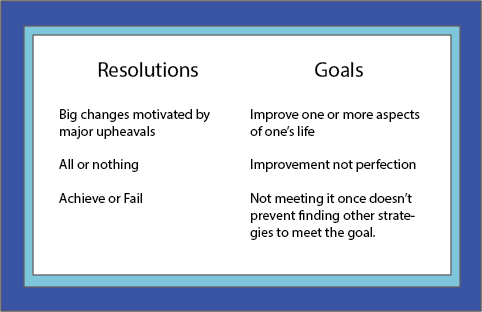New Years Goals
New Years come and go, and while resolutions are generally ineffective, New Years Goals may be a more appropriate way to meet the month of January.

Think about it: a resolution is a firm resolve to do something. Resolves are good, but they require a major life change. And the motivation to make a serious life change doesn't occur just because December 31 has returned.
But that doesn't mean we have to throw out all plans for self-improvement or self-control. But an all-or-nothing resolution isn't a necessity to achieve a goal.
Let's take two common examples. "I resolve to lose weight."
It's a great goal. There's only a little problem with the first one. Your diet is part of your culture; and changing your culture is a bit hard to do. Oh sure, you can buy healthy foods on January 1st to last you two to three days, but after that real life takes over. You find yourself in the same situation you had before: needing something fast to fix for dinner. The faster it is the fatter it is - usually. Perhaps you find yourself heading through the notorious drive-through "just one more time." The second time it happens, you just have to face it. This weight loss thing ain't happening.
The problem is, healthy foods are harder to make, slower to cook, and don't have a long shelf life. Instead of the resolution, "I AM going to lose weight!" you need a realistic goal.
Goal: I am going to find seven healthy meals that fit with our schedule and that we like to eat.
I made it a goal this last year to incorporate fish into our diet three times a week. It didn't happen instantly; but it was a goal and I achieved the goal - at least most weeks.
Here's another personal example. I had a New Year's Goal three years ago that I would avoid big box stores as much as possible. If I had made a resolution (I resolve to never shop in a big box store again for the rest of my life) I would have failed the next time we went out of town.
But I now probably go to the big stores two or three times a year, instead of every month or more. Every once in a while it becomes necessary; those strange occasions when I need index cards, socks, black thread, green glitter, and ketchup - and I don't have time to stop at five places.
But I shop at those stores much less. And surprisingly (or maybe not) I spend a lot less money than I used to. That may seem strange because for some items I actually end up paying more at other places. But the big stores so effectively place all their great priced merchandise in the right places, and I thought I was saving money to buy it. Yes, I paid less money for stuff I didn't need and now seldom buy.
A New Year's Goal isn't a culture shift or major life change. Such changes do happen, but not every year. And, if you do find yourself back to your established behavior, it doesn't mean you have failed and future efforts are vain.
But, goal setting can be an effective strategy for making beneficial improvements.
Where is your program weakest? What can you make to improve in one or two areas?
Goals produce steady, measurable changes. Resolutions, on the other hand, are valuable - but only when you come to a significant crossroads. Even without a crossroad, goals are obtainable.


About Our Site
Hands-On Learning












